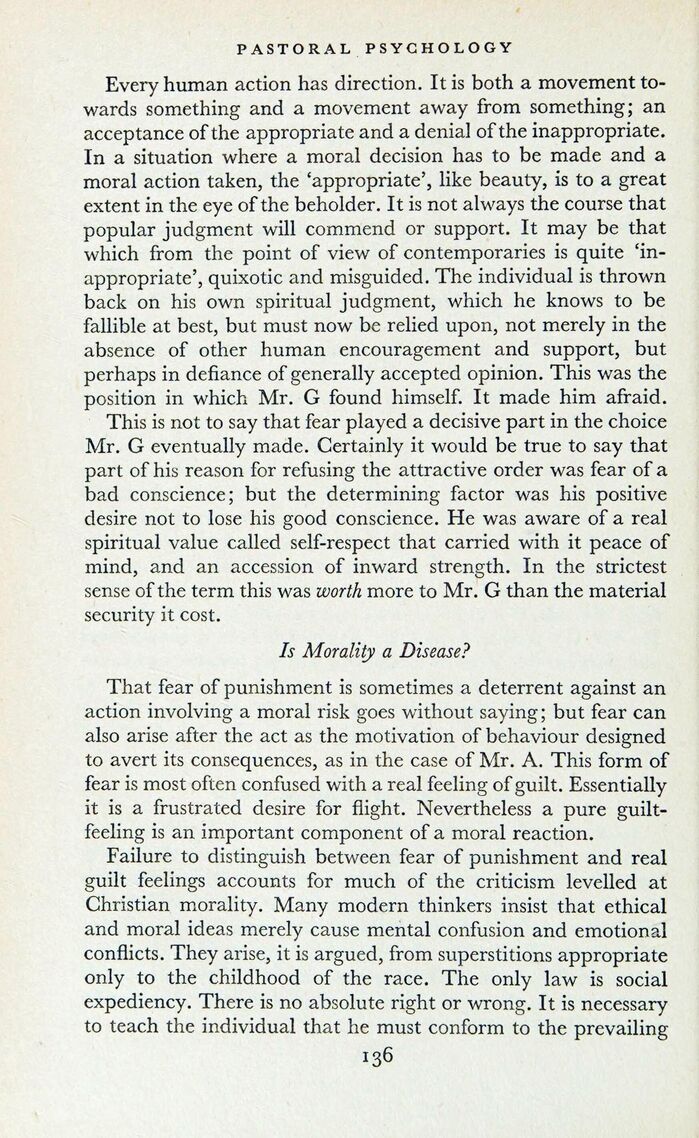
Full resolution (JPEG) - On this page / på denna sida - Part 4. Guilt and the Fear of Punishment - 1. Morality and Fear of Punishment - The Bi-polarity of Moral Attitude - Is Morality a Disease?

<< prev. page << föreg. sida << >> nästa sida >> next page >>
Below is the raw OCR text
from the above scanned image.
Do you see an error? Proofread the page now!
Här nedan syns maskintolkade texten från faksimilbilden ovan.
Ser du något fel? Korrekturläs sidan nu!
This page has never been proofread. / Denna sida har aldrig korrekturlästs.
PASTORAL PSYCHOLOGY
Every human action has direction. Itis both a movement
towards something and a movement away from something; an
acceptance of the appropriate and a denial of the inappropriate.
In a situation where a moral decision has to be made and a
moral action taken, the ‘appropriate’, like beauty, is to a great
extent in the eye of the beholder. It is not always the course that
popular judgment will commend or support. It may be that
which from the point of view of contemporaries is quite
‘inappropriate’, quixotic and misguided. The individual is thrown
back on his own spiritual judgment, which he knows to be
fallible at best, but must now be relied upon, not merely in the
absence of other human encouragement and support, but
perhaps in defiance of generally accepted opinion. This was the
position in which Mr. G found himself. It made him afraid.
This is not to say that fear played a decisive part in the choice
Mr. G eventually made. Certainly it would be true to say that
part of his reason for refusing the attractive order was fear of a
bad conscience; but the determining factor was his positive
desire not to lose his good conscience. He was aware of a real
spiritual value called self-respect that carried with it peace of
mind, and an accession of inward strength. In the strictest
sense of the term this was worth more to Mr. G than the material
security it cost.
Is Morality a Disease?
That fear of punishment is sometimes a deterrent against an
action involving a moral risk goes without saying; but fear can
also arise after the act as the motivation of behaviour designed
to avert its consequences, as in the case of Mr. A. This form of
fear is most often confused with a real feeling of guilt. Essentially
it is a frustrated desire for flight. Nevertheless a pure
guiltfeeling is an important component of a moral reaction.
Failure to distinguish between fear of punishment and real
guilt feelings accounts for much of the criticism levelled at
Christian morality. Many modern thinkers insist that ethical
and moral ideas merely cause mental confusion and emotional
conflicts. They arise, it is argued, from superstitions appropriate
only to the childhood of the race. The only law is social
expediency. There is no absolute right or wrong. It is necessary
to teach the individual that he must conform to the prevailing
136
<< prev. page << föreg. sida << >> nästa sida >> next page >>